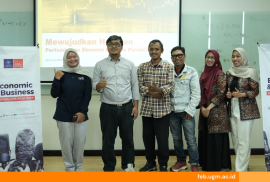Government plans to decrease fuel prices for premium and diesel oil by Rp500 per litre starting 1 April 2016. Currently, premium oil costs Rp 6,950 per litre while diesel oil Rp5,650 per litre.
Energy observer from UGM, Dr. Fahmy Radhi, M.B.A., appreciated the policy, however, the Rp500 reduction would not impact significantly on the economy.
“A reduction as little as Rp500 cannot contribute to the increase of people prosperity, just increasing thir purchase power,” he said on Thursday (31/3).
In his opinion, the most appropriate price ranges between Rp750,00 – Rp1.000,00 per litre. “If the reduction is above Rp750, it can bring multiplier effects, affecting people prosperity.” A Rp500 reduction will only advantage the state oil company Pertamina.
“This reduction is not fair as it only benefits Pertamina while the people no longer receive subsidies,” he said.
Fahmi added the government need to be transparent in calculating fuel prices, so does Pertamina.
“It needs transparency on the reduction of fuel prices. The public needs to know clearly related to fuel sales revenues while the world oil price is at the low level,” he said.
Government Intervention Needed
Fahmi mentioned during oil price increase, basic needs prices also automatically increase. But during fuel price decrease, basic needs prices and transport prices do not follow suit instantly.
“No automatic decrease, there’ll be a delay in terms of time,” said the economist.
Fahmi expected the government to do intervention on prices of basic needs and transportation. This momentum can be made use by making a regulation jointly with transport operators to fix a rate. Market intervention can be taken by the government in terms of basic needs.
“The decrease will be meaningful if the government makes intervention related to transportation or market operation. Without these, the fuel price decrease will be meaningless,” he said.
Source: ugm.ac.id




